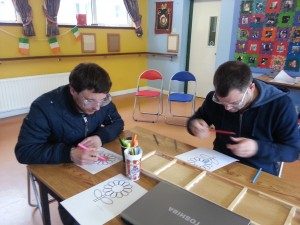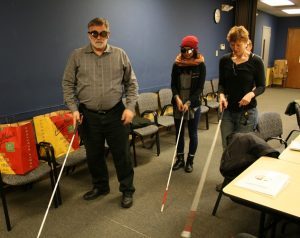The Anne Sullivan Centre provides training and information sessions to the families of people who are deafblind and a broad spectrum of professionals who work with people who are deafblind including teachers, SNA’s, nurses and social workers.
As the organisation is dedicated to raising awareness of deafblindness on a national level, we are available to provide deafblind awareness training in schools, workplaces and clubs and societies around the country.
If you would like to find out more about the type of training we can offer please contact outreach@annesullivan.ie or call 01 2898339

Anne Sullivan Centre deafblind awareness training
What can we offer you?
The Anne Sullivan Centre provides training sessions for individuals and groups
this training is prepared and facilitated by a team of consultants, intervenors and social care professionals with extensive experience supporting people with combined hearing and vision impairments.
All our training can be customised. We adapt to your needs in terms of numbers of training sessions required, the length of each session, numbers of participants, content and format of training. Training is interactive and encourages group participation.
In general, training courses provide:
- An introduction to deafblindness-explanation and definitions
- Facts and figures on the prevalence of deafblindness in Ireland
- Communicating with individuals with combined hearing and vision impairments
- Causes and consequences of deafblindness
- Key considerations for organisations and services
- Simulation exercises
- Overview of services provided by the Anne Sullivan Centre
Training courses also cover the following topics upon request
- Assessment Process
- Teaching strategies
- Developing communication systems and symbols. Participants will learn a variety of techniques and modes of communication used by people who are deafblind
- Examples of each mode as well as how to integrate symbolic communication will be explored
- Cortical Visual Impairment (CVI), CHARGE Syndrome strategies and techniques for hearing and vision assessment in the natural environment
- Adapting the curriculum and writing education plans for children with dual sensory impairment.
- Participants should bring sample educational goals as well as curriculum lesson plans and be prepared for practical work
 Who is it for?
Who is it for?
Anyone who might be in contact with an adult or child with some degree of hearing and sight loss e.g.family members, front line staff, managers, SNA’s, teachers, OT’s, SLT’s, PT’s, Social Workers, Psychologists, Audiologists, Ophthalmologists, and office staff Other people associated with your organisation e.g. volunteers, advocates or students
Our audience to date…
Throughout 2016 we provided training to 450 health and social care practitioners, students and teachers in a wide range of settings including:
- Community resource centres
- Respite centres
- Primary/secondary/Pre/special schools
- Universities
- Hospitals
- Disability service providers
- Early intervention services
We aim to provide increased awareness training during 2023 in an effort to influence a wide range of individuals and groups to recognise the abilities of all people to lead full and meaningful lives and the importance of removing the barriers that prevent this.

